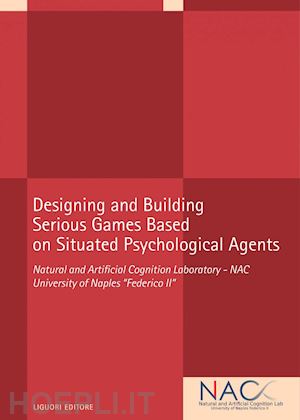In the last decade, the “serious games” label has become widespread to indicate a varied field of production of digital games to be used in various educational, training, educational and psychological assessment contexts. Even if our research group has often resorted to this name to communicate the nature of our “things” I have always had a natural aversion to associating “seriousness” with “playfulness”. According to Giampiero Dossena, one of the most excellent Italian game experts, or the game is funny, or it is not a game (Dossena, 1993). Another element of perplexity in dealing with the topic of “serious gaming” is the classificatory attempt in systematizing the various “serious” games in families and typologies to define the distinctive features of a game authentically (or seriously) “serious”. Well, I don’t know if what we have produced in the last twenty years thanks to many research projects funded by European programs in the Laboratory of Artificial Natural Cognition of the University of Naples “Federico II” and at the Institute of Cognitive Sciences and Technologies of the National Research Council can be labeled as “serious” and as a “game”. For sure, we have tried to develop learning environments that can at least capture the interest of the user if it is not possible to amuse him/her. The design methodology that shapes the examples described in the following part of this booklet (extensively described in Dell’Aquila et al., 2017) is introduced here. Obviously, our method is just one of the many ways to realize game-based digital learning tools.With the advent of the computer, a compelling research methodology has also emerged in humanistic disciplines: The reconstruction, representation, and simulation of reality in a digital environment. So much so that currently the computer simulation of “models” of cognitive, psychological, affective and social phenomena is a necessary and fundamental process of any serious scientific attempt to understand humans in every dimension (biological, psychological and social). At the beginning of this century, Domenico Parisi (2000, 2001) had the intuition to propose the use of computer simulations as a powerful tool for supporting learning and teaching processes. Parisi’s reasoning was linear: the researchers learn and understand the reality by reconstructing it on the computer. After all, researchers are human beings, so why not apply the same method so that everyone (children, adults, the elderly, etc.) can learn through simulations? The idea was right and bright but, in order to bring it to a concrete level it was necessary to address two fundamental problems: 1) which of the many computer modeling techniques was the most suitable for the design and implementation of educational simulations; 2) how to make the interaction of people pleasant and intuitive with mathematical models, even very sophisticated such as any computer simulation is. The first question concerns the “engine” and the other deals with the “body” of educational simulations. The work of the research group to which I’ve belonged for twenty years aims at investigating these two aspects. As regards the definition of the modeling methodology underlying our applications, we have identified in the Psychological Agents Modeling a valid tool for the design and development of serious games.In this context, a given psychological phenomenon is represented through the simulation of the environment characteristics where one or more artificial agents, endowed with a perceptive and behavioral apparatus, interact with each other (first level of modeling) and the type of control system (or intelligence) of each individual agent (second level of modeling). Educational design must first of all deal with defining the characteristics of the psychological setting (first level of modeling) to be simulated in digital. About this issue we can have a wide range of situations, there can be single-agent games (as in the case in which an individual must learn to solve a test-problem to evaluate his IQ); dyadic games (as happens in selection interviews) and games in which many individuals take part (as occurs in a workgroup, etc.). The trainer/designer will also have to deal with the second level of modeling, that is to define which agents/avatars must be equipped with artificial intelligence and which ones to leave to the control of the user-player. It is easy to understand how the various design choices for the two modeling stages can be the basis for very different simulations and games.As for the development of interfaces since the early 2000s, we have invested heavily in 3D graphics (with results that are not always exciting). Since 2008 we have begun to enrich physical objects (toys, tools, bottles, fabrics, etc.) with NFC sensors to use them as tangible, multi-sensory and manipulable interfaces with the simulation-game resident in a computer and more recently in a smartphone.In what follows, we will introduce some examples of our prototypes built on this approach. The reader will evaluate if our approach has produced at least something serious and hopefully, fun.A special thanks goes to Elena Dell’Aquila, Michela Ponticorvo and Franco Rubinacci for the editing of the present booklet, and the co-authors of the book Educational Games for Soft-Skills Training in Digital Environments for the content. Finally, I take this opportunity to thank all the colleagues and friends that shared with us the wonderful experience of the NAC in the past ten years.













